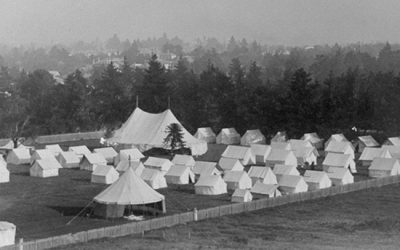What is the role of a pastor in the Adventist Church?
The position itself, at least as far as a local congregation is concerned, is not much different from that of pastors in other protestant denominations.
An Adventist pastor’s role is to nurture the congregation to become more like Jesus Christ. They do this by preaching sermons, encouraging evangelistic efforts, and providing support and guidance for church members.
But how exactly is this role supported by the Bible?
Let’s look more closely at:
- The biblical origins of pastors
- The role and duties of a pastor
- The job qualifications of an Adventist pastor
- Pastoral ordination
- Types of pastors
- How Adventist pastors preach the Bible
- How the pastoral ministry evolved
We’ll start with how the role of an Adventist pastor began.
The biblical origins of pastors

Photo by Patrick Schneider on Unsplash
Individual congregations of the Seventh-day Adventist Church are led by church pastors. This ministerial position is not only essential to the work of the church, it’s also a biblical reflection of leadership:
“And He Himself gave some to be apostles, some prophets, some evangelists, and some pastors and teachers, for the equipping of the saints for the work of ministry, for the edifying of the body of Christ,…” (Ephesians 4:11-12).
The word “pastor” is Latin for shepherd.
And that’s actually quite fitting. There’s an obvious connection between spiritual leaders and shepherds in the Bible.
Take Moses for instance: He worked as a shepherd (Exodus 3:1). And soon enough, his patient work with wandering sheep prepared him to lead the people of Israel back to God.
David also worked as a shepherd in his boyhood, which prepared him to guide the nation of Israel (Ezekiel 34: 23, NKJV).
When you think of shepherds, you usually think of someone humble, right? Shepherds don’t exalt themselves as lords over their sheep. (That’d be a little silly!) They guide them and protect them from harm. They are compassionate and devoted to their flock.
And that’s exactly what Jesus calls His pastors to be like!
The role of the pastor

Photo by LinkedIn Sales Solutions on Unsplash
In short, a pastor’s job is to lead church members to follow in Jesus’ footsteps. They aim to carry this out in many different ways:
- Preach the Bible: They preach sermons discussing the Bible and its principles, with a focus on how we can apply these concepts to our lives today.
- Organize outreach events: Depending on the needs of their community, pastors lead their church in organizing events such as health seminars, family fun events, holiday programs, literature distribution, etc. They also encourage members to collaborate with local community service initiatives, or to organize their own.
- Guide evangelism efforts: Pastors provide ideas and support for their church in planning things like evangelistic events or series, inviting Adventist evangelists to present at their church, or gathering Bible study interests in the area.
- Lead special ceremonies or programs: You’ll often see pastors performing baptisms, marriages, funerals, etc.
- Prepare worship service: They recruit members to perform parts of the weekly Sabbath worship service like special music and prayer. Some pastors will suggest certain hymns, songs, or passages of Scripture for the service that goes along with the topic of that week’s sermon.
- Create a program for visiting those in need: Pastors always keep note of members who are lonely, ill, elderly, or simply unable to leave their homes. Depending on the size of the congregation, the pastor will make the rounds to visit these church members or delegate some elders to help as well.
- Nurture church growth: They encourage members to grow toward baptism and strengthen their relationships with Christ.
That’s a lot of work for one person!
Fortunately, another well-known duty of a pastor is to properly and efficiently delegate appropriate jobs to the established structure of the congregation.
For example, Adventist churches are set up so the pastor gets to work with the local church board. The church board is made up of church-elected members who vote to make church decisions, like registering new members, deciding the best uses for the church budget, or maintaining the church calendar of events and activities.
And even though pastors lead the board as the chairperson, their role is more of an advisor than acting as one who calls all the shots.1 The idea is to help the church work together as a team.
Pastors also delegate tasks to church elders, deacons, and deaconesses who help with various routine functions of a church.
Different types of pastors
The bigger the church, the more pastors are needed to manage church affairs. Here’s a short list of some of the different types of pastors you might encounter:
- Senior pastor: These pastors are the main authority in the church. They handle the bulk of the responsibility.
- Associate pastor: An associate pastor assists the senior pastor in their duties. Their position could be general, or it could take on specific titles, depending on the needs of the congregation. Some examples of these titles could be:
- Young families pastor
- Discipleship pastor
- Children’s pastor
- Executive or administrative pastor
- Young adult pastor
- Outreach pastor
- Youth pastor: A very common type of associate pastor that oversees youth events for the church and community. This includes the youth Sabbath school class(es), availability for counseling and guidance, and leadership or assistance in other groups or programs, such as pathfinders, campus ministries, etc.
Pastors as Bible preachers
Even amid all the various tasks involved in leading and nurturing a congregation, one of the most important duties of a Christian pastor is to preach the Word of God.
Adventist pastors do this by using Scripture to determine how we should strive to live each day.
They also encourage church members to study the Bible for themselves.
“And I will give you shepherds according to My heart, who will feed you with knowledge and understanding” (Jeremiah 3:15).
Members are welcome to approach their pastors about Biblical matters. They may ask questions or address any ideas that confuse them.
After all, it’s one of a pastor’s greatest callings—to explain the Bible for people to understand.
Job qualifications of Adventist pastors

Photo on Adventist Media Exchange
Pastors must have a bachelor’s degree in theology and a masters in divinity.
Getting a bachelor’s degree takes about four years, and can be taken at any Adventist school, while a masters in divinity must be obtained through programs like the H.M.S Richards School of Divinity at La Sierra and the Theological Seminary at Andrews University.
Getting a master’s typically takes two years, and an additional four years of serving hands-on at local churches before the General Conference decides if the pastor is ready to be ordained.
This level of education helps build Bible knowledge in general, while also teaching methods of conducting Bible studies and the ins and outs of leading local congregations.
Students also study Greek and Hebrew to help them better understand Scripture’s original languages.
But beyond these practical benchmarks, there is one essential condition:
Pastors must be called by the Holy Spirit (Acts 1:8).
Even with all the training in the world, one could not be a pastor in the true sense of the word without the Holy Spirit’s blessing. It’s a difficult job that calls for someone with a special character and extraordinary gifts.
What is ordination?
Not every Adventist pastor is ordained. In fact, many pastors are instead licensed pastors.
But what exactly is the difference between ordained and licensed pastors?
Let’s start with going through the process of ordination.
Ordination is when a pastor asks to have their position recognized by the world church. This recognition comes with several important requirements.
Before being ordained, pastors must have a Master’s in Divinity and have at least four years of experience working with churches. The local conference, the governing body that oversees local churches in the area, will consider the pastor’s performance before putting in an ordination request, which is then submitted to the next level of administration (union office) and put to a vote.
When the request is approved, the pastor’s local church will arrange an ordination ceremony.
Conference officers often attend the ordination ceremonies, while ordained leaders like local elders and other pastors will lay hands on the pastor and pray for God to bless their ministry. 1 Timothy 4:14 and 2 Timothy 1:6 both discuss this practice of “laying on hands” to bless someone.
Ordination allows pastors to work beyond their local church,2 whereas the authority of licensed pastors is contained within their local church. This is part of the reason most pastors must be ordained to officiate wedding ceremonies, especially if they’re visiting another state. Although, some states require pastors to be registered as ordained pastors regardless.3
Licensed pastors are also supervised by an ordained pastor. This can be seen as a training period for licensed pastors, providing valuable on-the-job experience before they seek ordination.4
How the pastoral ministry evolved in the Adventist Church

Photo by Tye Doring on Unsplash
When Adventism first began, pastors assumed a more evangelistic role. Church leaders saw the value in having traveling ministers share the gospel.5
But, as the Adventist Church began to grow, there was a greater need for pastors to stay in one spot. They realized that pastors had a duty to lead and care for the Christians already in their care.6 While Adventists still have evangelists who travel to reach people across the globe, they have local pastors to nurture church growth.
Today, the General Conference assigns pastors to a church. And instead of congregations paying their pastors, local conferences are responsible for paying pastors a liveable wage with tithe money. That way, smaller churches and bigger churches alike can be assured pastoral leadership.
The pastoral ministry has indeed changed over the years—but the pastor’s call remains the same. They still occupy a role similar to the example of Jesus: the “good shepherd” (John 10:11).
Jesus was patient, compassionate, balanced, and sought the good of His followers. These are the ideals Adventist pastors strive to follow when providing pastoral care.
God has given pastors the incredible honor and responsibility of guiding His people in a faith community. Ordained or not, it is always a pastor’s job to nurture their “flock” and seek to bring people closer to Jesus.
You can be sure that pastors feel equally blessed to have this role:
“I think pastors have a unique opportunity to present people with hope. You can use your gifts and strengths to let God guide you to reach others.” —Pastor Buz Menhardt of the New Market Seventh-day Adventist Church.
Now that you’re an expert on pastors, learn what an Adventist worship service is like! Check out —
Find a Church
If you’re interested in finding a local Adventist church near you, you can use the Adventist Locator provided by the General Conference of Seventh-day Adventists.
- Hudson, A. Stanley, “Pastoral Roles in Adventism’s First Century,” Ministry Magazine, https://www.ministrymagazine.org/archive/1997/06/pastoral-roles-in-adventisms-first-century.[↵]
- Seventh-day Adventist Church Manual, 19th Edition, pp. 32, 75.[↵]
- “Can I Officiate Weddings in Other States?” theamm.org, https://theamm.org/faq/17-can-i-officiate-weddings-in-other-states.[↵]
- Seventh-day Adventist Church Manual, 19th Edition, p. 33.[↵]
- Hudson, A. Stanley, “Pastoral Roles in Adventism’s First Century,” Ministry Magazine, https://www.ministrymagazine.org/archive/1997/06/pastoral-roles-in-adventisms-first-century.[↵]
- Ibid.[↵]
Related Articles
More Answers
Seventh-day Adventist World Population and Demographics
The Adventist Church has more than 22 million members and 100,000 churches worldwide, plus a large system of hospitals, schools, and publishing houses. Learn more about this diverse church.
What Is a Seventh-day Adventist Camp Meeting?
Although camp meetings didn’t begin with the Seventh-day Adventist Church, they’re as much an Adventist thing as haystacks.
Camp meeting is an extended event for Adventists (and non-Adventists) of all ages to gather and participate in spiritual seminars and activities. During the event, attendees often camp in tents, campers, or RVs.
How to Join the Seventh-day Adventist Church
Whether you heard about the Seventh-day Adventist Church through a traveling evangelist, during your online searches, or through a loved one or relative, you might be considering joining yourself.
How Do Adventists Do Baby Dedications?
For Christians, dedication ceremonies for babies, also for older children, are an important time for parents and the church. It’s a special part of the worship service when parents present their young children to God and the church family. Both parents, along with the congregation, regard this as a solemn promise to be a Christ-like example to the child.
Do Adventists Celebrate Communion and Foot Washing?
Like many Christian denominations, Adventists regularly participate in communion, also referred to as the “Lord’s Supper” or the “Last Supper.” They also practice foot washing (John 13:1-20), or the “ordinance of humility,” during the service—which isn’t as common.
What is the Concept of “Present Truth” and Why is it Important?
Present truth is the principle that certain biblical truths are relevant to God’s people at specific times in history. God sends the Holy Spirit to reveal truths that help us better understand how to interpret and apply His Word in a present moment.
Do Seventh-day Adventists Celebrate Easter
Yes, many Seventh-day Adventists do celebrate Easter.
Does the Adventist Church Have Youth Ministry Programs?
The Seventh-day Adventist Church has been organizing and operating youth ministry programs since 1879.
In our opinion, youth ministry is one of the most important ministries a church can have.
Do Adventists Celebrate Birthdays?
Yes, most Seventh-day Adventists do celebrate birthdays because we see them as excellent reminders of the life God has blessed us with. And we celebrate them the same way everyone else does—with friends, family, presents, and a special meal.
What Do Adventists Offer for Young Adults?
In recent years, the age group often classified as “young adults” has been trickier to engage. It’s been a significant concern for Christian churches around the world. Though interestingly enough, similar observations regarding young adults have been coming up in conversations about the economy, the entertainment industry, politics, and more.
Do I Need to be an Adventist to be Saved?
The answer to this question is simply, “no.”
When it comes to salvation in Jesus Christ, all that is required of a person is to acknowledge Jesus’ sacrifice for us, believe that He has saved us, and claim the free gift of salvation that is always available to us. Salvation is not based on denomination.
Do You Have to Be Vegetarian to Be Adventist?
Of course not. Membership in the Seventh-day Adventist Church has never included any dietary requirements. However, there might be some reasons people might think that. So many Adventists are vegetarians or even vegan, and a plant-based lifestyle has many health benefits.
All About Seventh-day Adventist Colporteurs
The Seventh-day Adventist Church uses a variety of methods to spread the hope of the gospel to the world. One of these ways is through colporteuring, also called “canvassing” or “literature evangelism.”
What Is an Adventist Book Center (ABC)?
When you walk into any one of the many Adventist Book Center (ABC) locations, chances are you’ll be greeted by pleasant gospel music in the background, friendly employees, and row after row of Christian books, movies, Bibles, study guides, kids’ games, and more.
Do Seventh-day Adventists Celebrate Holidays?
Wondering whether your Adventist classmate or coworker keeps the same holidays you do? Perhaps you want to include them in some festivities, but you also want to respect their beliefs. Thus, you’re unsure of how to navigate the holiday question. Will they accept your invitation to the office Christmas party?
The Adventist Haystack (It’s Not What You Think) + 4 Recipes
Haystacks are basically a taco salad—with an Adventist spin on it! Most versions are vegetarian and offer an endless combination of tasty toppings. We eat them often because they’re healthy, scrumptious, and easy to make.
Do Seventh-day Adventists Believe in Medical Care?
The Seventh-day Adventist Church believes in and supports evidence-based medical care. In fact, medicine has played a significant part in our history, and today we run a major health system with hospitals, medical schools, and clinics throughout the world.
All about Adventist Elementary Schools
The Seventh-day Adventist Church operates the largest Protestant education system in the world. A big part of this system is our K-8 elementary schools, or primary schools, as they’re known in other parts of the world.
What Are Pathfinder and Adventurer Clubs?
Like the boy or girl scouts, Pathfinders and Adventurers learn about nature and life skills. But what makes these clubs special is their purpose to bring young people closer to Jesus.
A Look at Adventist Colleges and Universities
On the outside, Seventh-day Adventist universities may not look much different than other college campuses. But the real differences are beneath the surface.
What Is ASI (Adventist-Laymen’s Services and Industries)?
ASI, which stands for Adventist-laymen’s Services and Industries, is a membership-based organization that provides support for Seventh-day Adventist laypeople (Adventist professionals who aren’t pastors).
What Are Adventist Evangelistic Meetings?
The Seventh-day Adventist Church puts a huge emphasis on sharing the gospel through evangelism, or sharing the gospel through preaching, teaching, and testimony. One of the ways we accomplish this is by organizing public events called evangelistic meetings.
Christian Summer Camps—A Cherished Adventist Ministry
School’s out, the sun’s shining, and your kids are thrilled to have the summer ahead of them. Then three days in, you hear, “I’m bored…”
Do Adventists Have Their Own Bible?
Adventists have some unique beliefs—you might be able to name some of them right now. The seventh-day Sabbath. Death as a sleep. Hell as nonexistence.
What Is Vespers?
Friday rolls around, and you’re spending time with your Adventist friends or relatives when they mention they’re going to vespers tonight.
The Leadership Structure of the Seventh-day Adventist Church
The Seventh-day Adventist Church has a representative form of structure that connects its 90,000-plus congregations across the globe and gives its members a part in decision-making. Though the Church was incorporated in 1863, this system came about during the church’s reorganization from 1901 to 1903. It includes four levels of organization.
What to Expect When You Go to an Adventist Church
If you’re attending an Adventist church for the first time, you may wonder what it’s really like. While each Adventist church is unique in its collective personality and local culture, Adventist church services are generally similar to most other Protestant church services.
Adventist Education
Seventh-day Adventists have historically upheld the importance of a well-rounded, high-quality education. Instead of a one-size-fits-all approach to teaching and learning, the Adventist Education system operates on the principle of educating the “whole” person.
Evangelism
Evangelism is simply sharing the truths of the Bible with someone else. And Adventists are all into it.
Didn’t find your answer? Ask us!
We understand your concern of having questions but not knowing who to ask—we’ve felt it ourselves. When you’re ready to learn more about Adventists, send us a question! We know a thing or two about Adventists.
































